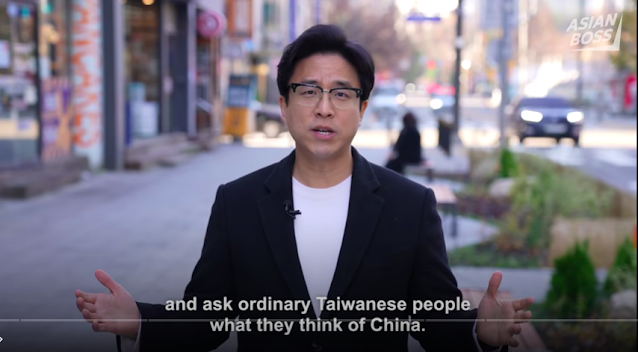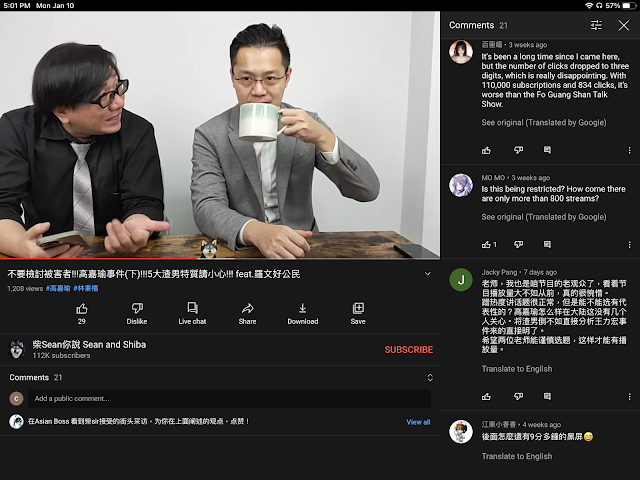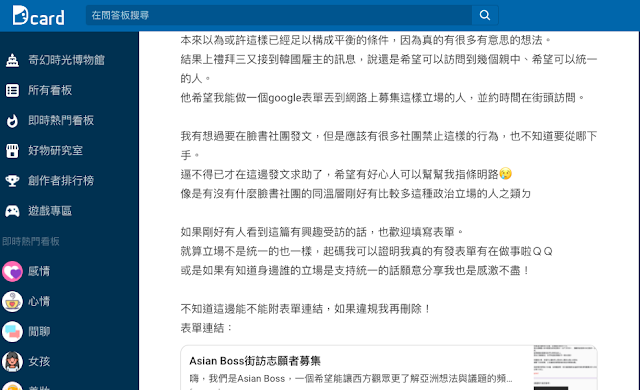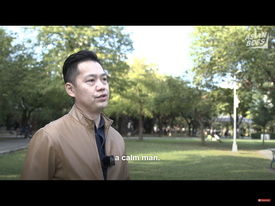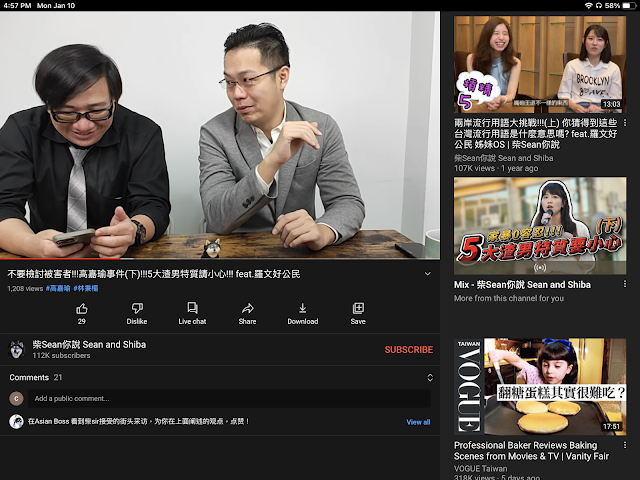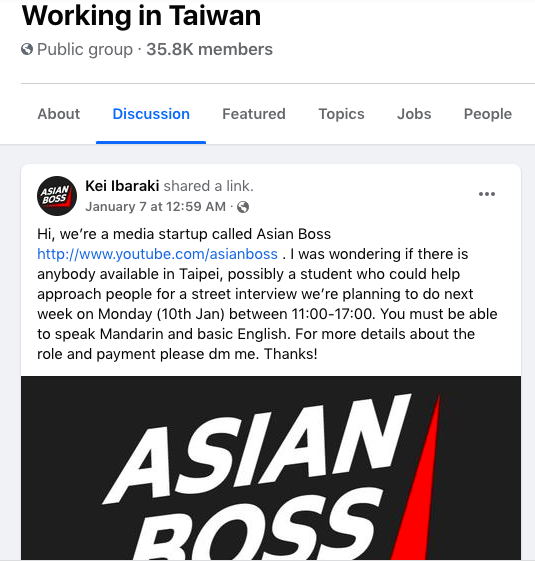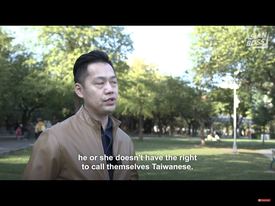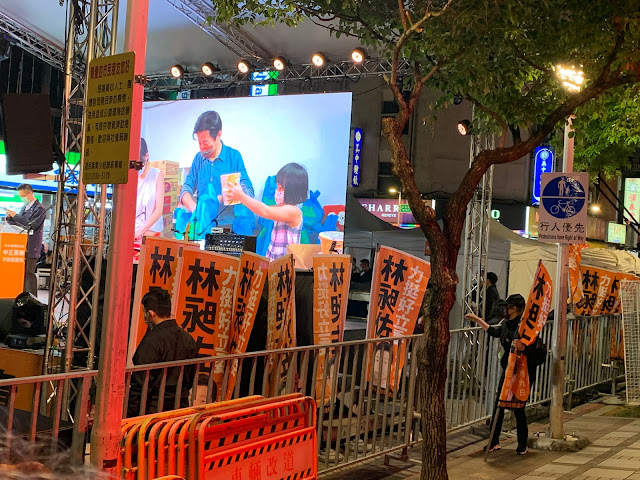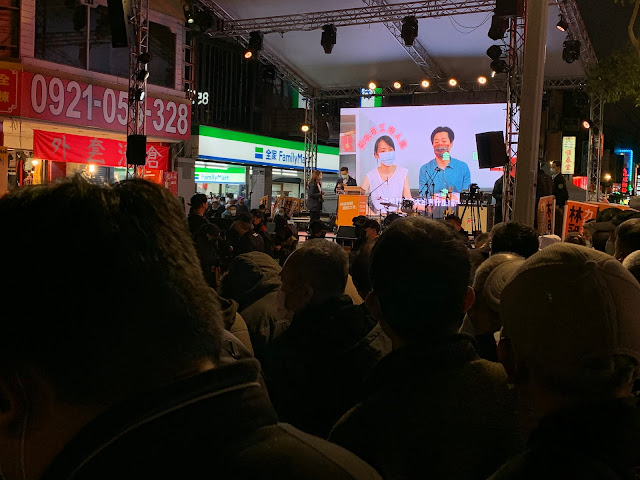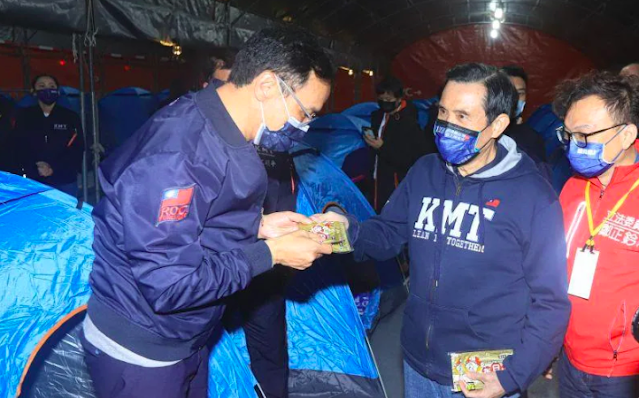Since my last post regarding the Asian Boss video "What do Taiwanese think of China?", I've been able to speak to someone who almost got involved in the project, only to pull out because he didn't want to be a "propaganda shill" and felt the work was "journalistically unethical".
Here's a summary: Asian Boss didn't just decide to seek out a pro-KMT viewpoint and present that as a street interview. They did all of the filming but felt that the video had too many "green" (pro-Taiwan, wary of China) viewpoints, so they wanted another blue viewpoint "to give a balanced view". They didn't want just any deep blue perspective: they wanted it to be filmed in an area where young people hang out, and implied he wanted a younger-looking person to deliver this opinion. They did not want to spend any more time filming people that didn't have the opinion they were looking for, but rather to "pre-screen" interviewees and reject anyone who didn't have the desired political views.
In the end, it was too hard to find someone like that, so they went with 柴Sean你說, the Youtuber mentioned in the last post.
How do I know all of this? I spoke with Christopher K. Young, the independent video producer they originally spoke to about obtaining such footage. He agreed to let me publish his story, with his name, to clarify exactly what happened with that video.
Christopher is the admin of the Filmmaking: Taiwan Facebook group where one of the founders of Asian Boss first posted the request to film "an interview" on December 2nd. As he films with the requested equipment and can outsource projects to his own people, he also messaged the poster to discuss the project -- a field camera and reporter to "hit the streets for 5-6 hours" to get the desired interview.
Talent was suggested and a rate agreed upon, but there were caveats. Much of the rest of the conversation took place on a call.
"I wasn’t just to hit the streets and take interviews. I was to only accept interviews with pro blue opinions. I told him I felt that was journalistically unethical and was going to put my reporter in the position of having to engage people in needless confrontation," Christopher told me.
The person from Asian Boss said they already had "a bevy of green interviews and desired some blue interviews to give a balanced viewpoint," in Christopher's words.
Specifically, Christopher -- or the reporter he was going to send -- was being asked to pre-screen interviewees because they didn't want to pay for field time recording interviews they felt they couldn't use.
Christopher then suggested pre-arranged interviews, as asking a reporter to stand on the street asking passerby for interviews but saying they're no longer interested upon hearing the interviewees are green is "asking for a fight".
Which is indeed true. Could you imagine standing on a street in any Taiwanese city (even Miaoli!) asking for vox pops on Taiwanese views of China but turning away anyone who offered up a viewpoint that wasn't pro-KMT or pro-China enough?
They were asking for even more trouble given their other desired parameters for this interview. "I told him I could see if I could find such an interview in an oldies park or something," Christopher said, "but he’d heard of 西門 [Ximen, a popular LGBT-friendly area where Taiwanese youth might hang out] and wanted us to go there."
Again, can you imagine going to Young Gay Bar Central and saying 'hey I'd like some street interviews but only if you support the KMT'? Beyond the confrontations that would certainly ensue, could you imagine how bad that would look for you, and how unlikely success would be?
Asian Boss insisted, again in Christopher's words, that it "had to look like a street interview", at which point he turned down the project.
"I noped out," he said.
"I told him I could tag the videos that have the opinions he was looking for, I can understand that, but that if no blue opinions could be found, that such would be representative of what Taiwan looked like from a political standpoint, especially considering the demographic he wanted me to mine," Christopher continued.
That said, the decision not to work together was not entirely one-sided. " If I’m being completely fair, the decision to not work with one another was mutual," Christopher said.
"Ahead of the last call that we had, he claimed he was giving thought to his methodology and I therefore was on standby to see if how they were going to approach the video was going to align with my views on a journalistically ethical, or at least conversationally unconfrontational, interview process."
In my opinion, Christopher is exactly correct: if you go out and interview younger people, and what you get are mostly green-leaning opinions, then that's simply what people think. It would still be anecdotal, but without doing methodologically sound research with a sufficient sample size, it would be as close as a street reporter could possibly get to the truth. The consensus. The balance.
Injecting something different into those results -- something you have to search for, even post on Dcard to beg for -- is manipulative. It's not balance: it's a false narrative positing that these views are more common among younger people than they actually are.
"He and I were both clear that he was going to have to dig deep to find a young blue opinion and I was to make it look like a street interview, which I wasn’t okay with, so I passed," Christopher added.
At that point, Asian Boss told him they were going to with the Youtuber they'd found, but would still like to hire his reporter to do the filming. He connected them and then removed himself from the situation.
When discussing this arrangement, Christopher added: "I even expressed to [my reporter] my doubts that things...were going to work out, and wanted to confirm whether or not she wanted to work with them on their own....I didn’t want it to cost her a paycheck based on adherence to my personal principles."
Presumably, that interview took place as 柴Sean你說 was indeed interviewed and the video came out as planned.
It was indeed shot outdoors and perhaps could have passed for an interview of a random pedestrian in a park, but it seems the reporter did their job too well, offering a higher-quality visual product than the other street interviews.
That said, if something about the Youtuber stood out, it wasn't just that it was a better video, shot in good light at a flattering angle. His views truly are outside the mainstream, and he seemed all too ready to discuss them in eloquent detail. Frankly, I'm surprised he didn't come prepared with a PowerPoint.
Now, you know how it happened. There's even some inkling as to why. What people actually think -- the general consensus among Taiwanese, especially the youth -- isn't "balanced" enough for Asian Boss. Instead, they feel the need to project a false narrative of what views are common or mainstream among this demographic and the populace in general.
You can tell they were constructing that story themselves by some of their translations. For example, Daniel Ku notes in his reaction video, they translate "unification" (統一) as "reunification", when that's not actually what the term means.
In short, they didn't like that the spectrum of views they found in Taiwan leaned greener than they'd like, so they 'added' blueness to create the story they wanted to tell.
The story they wanted to tell. The viewpoint they wanted to disseminate. The spectrum, the range, the balance of views of average Taiwanese? That was all right there on the street for them to find. They rejected it in favor of their preferred narrative.
Asian Boss had two ethical choices here: go for a 'spectrum' regardless of how popular each view is and do clips from pre-arranged interviews, or do a true vox pop, where what you get is what you get. Doing the former would have required finding someone as fringe green as the Youtuber they found was blue. (Notably, they never tried to find such a person.)
Recruiting a dude because a vox pop didn't return your preferred story and presenting him as something he's not? Not cool. It stood out so much that I wonder if the people who ultimately approved the final product were even aware of how outside the mainstream their plant was.
Perhaps when you're getting high on your own supply of feel-good "balance", you don't recognize when you've gone so far off course that you've actually portrayed something inaccurate?
Christopher ended with this: "He sounded a lot like the speaker in the beginning of the video each time. Big platitudes about how balanced they want to be, that they hope their truth-seeking can in some way help avert war between the two countries...in each instance he was, in my opinion, telegraphing how unacceptable he knew their approach was going to sound."
That video was not an "accurate pulse" of what "ordinary people" think. It was not a neutral report of what they found when they "hit the streets of Taipei".
And it was not the story Taiwanese actually want to tell -- at least not the ones they found by canvassing the streets. It was Asian Boss's sandcastle.
Their story. Not Taiwan's.




